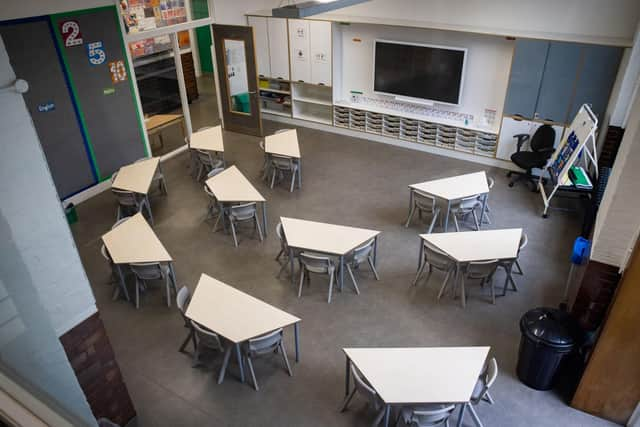Vulnerable school children in NI are being ‘chemically restrained’ because support services have been affected by Covid-19 - Education Committee describes evidence provided by Children’s Law Centre as ‘deeply disturbing
and live on Freeview channel 276
The Stormont Education Committee heard evidence from the Children’s Law Centre (CLC) about the impact of Covid-19 on school children in Northern Ireland with special education needs.
The CLC briefed the committee with a report and gave evidence via video link on Wednesday morning.
Advertisement
Hide AdAdvertisement
Hide AdIncluded in the report was the revelation that some of Northern Ireland’s most vulnerable school children with special education needs have been “chemically restrained” after smashing their head through windows and other hard surfaces.


Rachel Hogan (CLC’s Special Education Needs Representative) told the committee
“We know from the information given to us from the department of education that 209 children in Northern Ireland are identified as being in the category where they have no verbal way of communicating their frustration,” said Ms. Hogan.
“We don’t exactly how many of the 209 children have been chemically restrained but I would estimate between eight and 10 people have come to us (CLC) that have had to be chemically restrained.
Advertisement
Hide AdAdvertisement
Hide Ad“We have been told by medical professionals the children would not have required this increase in medication if they had not lost their primary protective factor of school attendance and the protective factor of respite.”
Ms. Hogan added: “What happens is when a child gets very, very distressed and starts to hit out they start to hit their head of hard surfaces as a way of venting frustration - that can be a window, a floor another person - we have had children putting their heads through windows with the potential for very severe damage.
“The psychiatrist in that situation,in the absence of service, is left with no choice but to increase medication that can be applied immediately to sedate the child so that they will be more calm and can be more easily managed.
“It will be a small number but even with a small group of children it’s a very serious action to take - what we are saying is instead of education and respite we will drug this child - it’s an abuse of their human rights.
Advertisement
Hide AdAdvertisement
Hide Ad“A child should only be medicated to receive treatment, not to sedate them - in any civilised society we should not be doing this to children who have severe learning disabilities and can’t speak to tell us how they feel - I think it is utterly reprehensible and should never happen.”
Committee Chair, Chris Lyttle MLA (Alliance Party) described the evidence presented by Ms. Hogan as “very disturbing” and said it highlighted “chronic under investment” in services for children and families with complex needs.
Comment Guidelines
National World encourages reader discussion on our stories. User feedback, insights and back-and-forth exchanges add a rich layer of context to reporting. Please review our Community Guidelines before commenting.
